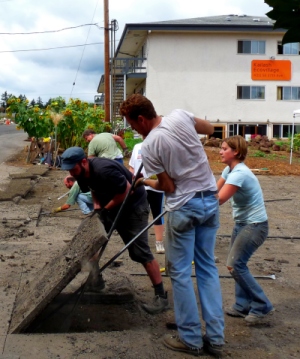Depave Paradise
Organization: Green Communities Canada
Country: Canada
Other Organizations Involved:
- LEAF (Toronto)
- Depave/City Repair (Portland)
- Green Venture (Hamilton)
- REEP Green Solutions (Kitchener-Waterloo)
- Environment Network(Collingwood)
- Greening Nipissing (North Bay)
- Hearthmakers (Kingston)

Background
Depave Paradise will ‘change the conversation’ about the urban landscape and reverse the proliferation of hard surfaces and the simplification of ecosystems, and to restore natural diversity by ripping up concrete and asphalt and replacing it with soil and vegetation.
Native species, especially trees, will be planted to act as filters and sponges for polluted stormwater/runoff and restore the natural hydrological cycle. Six communities will take this new approach through the simple yet emotionally compelling act of “liberating the soil” – using power tools to empower people in the destruction of the old grey concrete jungle, making way for new green landscapes. That’s empowerment!
Goals
- Build capacity for sustainable depaving activities to continue in multiple Ontario communities.
- Increase infiltration of stormwater by increasing permeable areas.
- Slow the flow of stormwater by enhancing the urban forest.
- Build a model for duplication in further communities.
Main activities
Activities include training of participating community-based delivery agents, volunteer recruitment and training, establishment of a local committee, identification of appropriate depave sites, securing all necessary permits and permissions, stakeholder engagement, conducting media/social media, conducting depave work-bees (weekends, with food and beverages), regenerating soils, re-vegetating sites, including tree-planting, documenting and evaluating the project, and assisting with replication. All activities will produce direct benefits for the urban ecosystem while pointing the way for transformative change, and building awareness and support for future activities.
Results
- 60 volunteers recruited, trained and participating;
- 6 local volunteer committees set up to plan future events;
- 150 m2 of area soil reclaimed/depaved;
- 600 m3 of stormwater diverted from storm sewers;
- 60 indigenous trees planted;
- 6 demonstration plots established with signage, visible to general public;
- more communities interested in participating